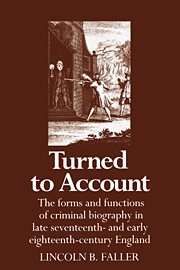 Turned to Account
Turned to Account Book contents
- Frontmatter
- Contents
- Preface
- Part I Turning criminals to account: three case histories and two myths of crime
- Part II Enucleating the truth: the criminal as sinner turned saint
- Part III Palliating his crimes: the thief as various rogues
- Postscript: Criminal biography and the novel
- Appendix I Who read the popular literature of crime?
- Appendix II The politics of thieving
- Notes
- Select bibliography
- Index
Part III - Palliating his crimes: the thief as various rogues
Published online by Cambridge University Press: 05 February 2012
- Frontmatter
- Contents
- Preface
- Part I Turning criminals to account: three case histories and two myths of crime
- Part II Enucleating the truth: the criminal as sinner turned saint
- Part III Palliating his crimes: the thief as various rogues
- Postscript: Criminal biography and the novel
- Appendix I Who read the popular literature of crime?
- Appendix II The politics of thieving
- Notes
- Select bibliography
- Index
Summary
What hatred the effect of his Feates purchased, the quaintness of them palliated.
G[eorge] F[idge], The English Gusman (1652), p. [v]They will rather joke upon this want of security on their roads, if you reproach them with it, than own it is a scandalous thing…. There are some Englishmen not less vain in boasting of the address of their highwaymen, than of the bravery of their troops. … a noted thief is a kind of hero, in high repute among the populace.
[Jean Bernard] Le Blanc, Letters on the English and French Nations (1747), 2:293What we are still more to wonder at, is, that … People should delight to hear the Actions of these Men rehearsed, and be even pleased with a Highwayman, who robs like a Gentleman.
Charles Johnson, Highwaymen (1734), p. 150When such a gallant Man as our Captain robs only for Necessity, and then makes Choice only of such Persons to collect from, as he of whom we have been last speaking, the Reader is not much displeased with him. There appears something so agreeable in the Manner and Circumstances of such a Story, as takes away a great Deal of the Resentment, which would otherwise arise against the Felony.
Johnson, Highwaymen (1734), p. 82What think you of a Newgate Pastoral, among the whores and thieves there?
Jonathan Swift to Alexander Pope, 30 August 1716, in Correspondence of Swift, ed. F. Elrington Ball, 2:330We must … use some illusion to render a Pastoral delightful; and this consists in exposing the best side only of a shepherd's life, and in concealing its miseries.
Pope, “A Discourse on Pastoral Poetry” (1717) in Poetry and Prose, ed. Aubrey Williams, p. 5- Type
- Chapter
- Information
- Turned to AccountThe Forms and Functions of Criminal Biography in Late Seventeenth- and Early Eighteenth-Century England, pp. 117 - 124Publisher: Cambridge University PressPrint publication year: 1987
